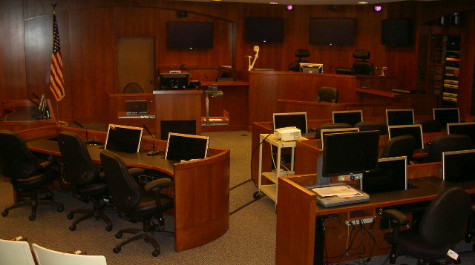Center for Legal and Court Technology to Test Admission of Allegedly Fabricated Computer Evidence in Mock Trial
CLCT Lab Trials are experiments that test the innovative use of technology to help resolve legal disputes. This year’s criminal trial is designed to test the degree to which it may be possible to fabricate digital evidence; how well jurors can understand computer experts; and how well William & Mary’s newly renovated high technology courtroom meets its design goals.
The defendant in United States v. Varic is charged with attempting to obtain a child from a foreign country for use as household help. The government’s evidence consists primarily of incriminating emails and other electronic evidence, which the defendant claims was fabricated by a third party trying to “set her up.”
“Can someone with significant technical capabilities use someone else’s computer to fabricate evidence so that person’s computer becomes a false witness against its owner?” asks Chancellor Professor of Law and CLCT Director Fredric Lederer.
The representative jury will comprise community members with different backgrounds and levels of technical understanding. The trial will be presided over by United States District Court Judge Barbara Rothstein, who is also director of the FJC. The expert witnesses will be supplied by the FBI. William & Mary law students will act as the attorneys in the case. Experts from the FJC and the National Center for State Courts in conjunction with CLCT staff will use the trial to better understand how jurors may react to criminal cases involving computer evidence and to refine CLCT’s future research agenda.
“We’ll examine how the attorneys would present this type of evidence, how the judge would handle it and, most importantly, how a jury would respond to it,” Lederer said. “We want to see how fully the jury considers the more technical information, where and how the jurors might become confused or dismissive, and how this defense might be received.
William & Mary Law School’s McGlothlin Courtroom is the world’s most technologically advanced courtroom. It was completely replaced in the summer of 2009, and United States v. Varic will test how well the new courtroom meets its design goals.
Founded as the Courtroom 21 Project in 1993, CLCT is a joint venture of the Law School and the National Center for State Courts that seeks to improve the world’s legal systems through the appropriate use of technology.
